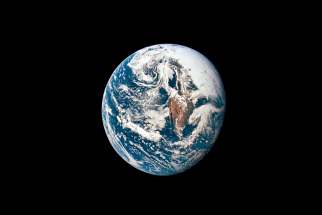Earth needs more than one day of care
Read this article for free:
or
Already have an account? Log in here »
To continue reading, please subscribe:
Monthly Digital Subscription
$0 for the first 4 weeks*
- Enjoy unlimited reading on winnipegfreepress.com
- Read the E-Edition, our digital replica newspaper
- Access News Break, our award-winning app
- Play interactive puzzles
*No charge for 4 weeks then price increases to the regular rate of $19.00 plus GST every four weeks. Offer available to new and qualified returning subscribers only. Cancel any time.
Monthly Digital Subscription
$4.75/week*
- Enjoy unlimited reading on winnipegfreepress.com
- Read the E-Edition, our digital replica newspaper
- Access News Break, our award-winning app
- Play interactive puzzles
*Billed as $19 plus GST every four weeks. Cancel any time.
To continue reading, please subscribe:
Add Free Press access to your Brandon Sun subscription for only an additional
$1 for the first 4 weeks*
*Your next subscription payment will increase by $1.00 and you will be charged $16.99 plus GST for four weeks. After four weeks, your payment will increase to $23.99 plus GST every four weeks.
Read unlimited articles for free today:
or
Already have an account? Log in here »
Hey there, time traveller!
This article was published 21/04/2021 (1698 days ago), so information in it may no longer be current.
For more than five decades we have celebrated Earth Day, marking 24 hours of the year where we are meant to contemplate the enormous impact humans have on the natural environment — but these days, the annual commemoration is in danger of doing far more harm than it does good.
When the first Earth Day was celebrated in 1970, there was still little understanding of the ways in which human actions impacted the planet. The scientific consensus supporting climate change was still a few years off, and it was still two decades until Canada and the United States came together for the landmark agreement that restricted pollution to prevent acid rain.
In 1970, there was an enormous impetus to create a day to raise awareness for the troubles humans were causing Mother Nature, and ultimately even our own health.
In 1970, there was an enormous impetus to create a day to raise awareness for the troubles humans were causing Mother Nature, and ultimately even our own health.
But much has changed in the time since. There have been many successes: minimizing the threat and impacts of acid rain, the regulation of CFC chemicals that were depleting the ozone, international agreement that lowering greenhouse gas emissions is critical to preserving anything resembling life as we know it.
The successes aside, though, what Earth Day has become is a day where corporations can post feel-good content about how they’re making things better, greenwashing their impacts to consumers. For individuals, minimal actions are undertaken for a single day, that allow us all to feel good for the rest of the year.
In anticipation of Earth Day, TD Bank, for example, posted a video on social media, declaring that as a corporate entity, they believe, “little things can make a big difference.” And the video focuses on recycling tin cans and the tagline reads, “TD is helping keep the planet healthy for all.”
Never mind that less than a month ago, a report was released by the Rainforest Action Network that tracked which banks were still investing in fossil fuel projects since the signing of the 2015 Paris Agreement on climate change, and RBC and TD both ranked in the top 10 globally. TD having invested US$121 billion in five years, RBC came in at US$160 billion.
But sure, recycle those cans. That will “keep the planet healthy.”
A report was released by the Rainforest Action Network that tracked which banks were still investing in fossil fuel projects since the signing of the 2015 Paris Agreement on climate change, and RBC and TD both ranked in the top 10 globally.
Banks are far from the only companies that are flaunting their green actions this time of the year, and while some are certainly genuine, consumers should definitely be giving corporate claims the smell test before endorsing brands because of their sustainability claims.
Net-zero emission pledges are meaningless if there is no feasible plan to get a company there.
For individuals, Earth Day offers a different obstacle to meaningful change because our own psychology is our worst enemy. Many people try to minimize the threat of climate change and downplay our responsibility in it so that, when the opportunity to make small changes in our life present themselves, we take them — like turning off the lights for an hour for Earth Hour. But as Norwegian psychologist Per Espen Stoknes has pointed out in his research, our brains typically amplify those small actions and allow us to put off bigger changes that might cause us more inconvenience, but that would also significantly lower our own carbon footprint.
Earth Day is wonderful in concept, but the truth of the matter is that we no longer need to raise awareness that we have a devastating impact on the planet. What we need is commitment and buy-in from individuals and corporations to make real and meaningful changes to how we operate. We can’t all just plant trees and call it a day.
Stop celebrating Earth Day. Start making changes in your life that will actually make a difference, all year round.
What we need is commitment and buy-in from individuals and corporations to make real and meaningful changes to how we operate. We can’t all just plant trees and call it a day.










